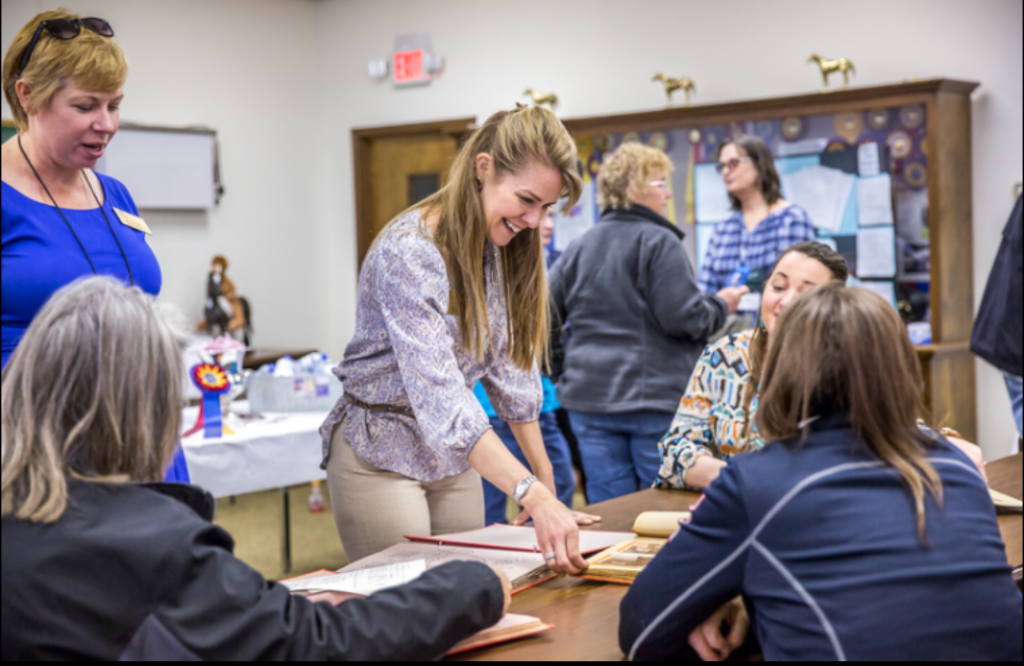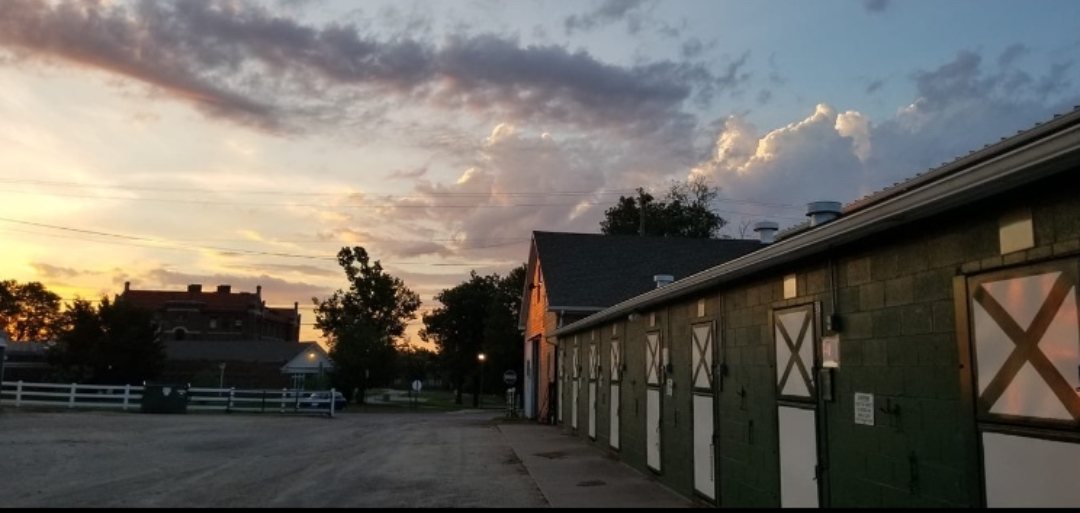The William Woods University stables, usually a hub of activity, took on a decidedly different feel in the middle of March 2020. That was when the WWU campus closed because of COVID-19.
Jennie Petterson, the Director of Equestrian Studies, was first struck by how quiet it was one day in late March as she walked out of one barn and toward one of the turnout lots to bring in a horse. Students who would normally help out in the barns had mostly returned home to finish the rest of their semester virtually at that point, in an effort to try to help reduce the spread of the virus. Only a handful of faculty/staff and students remained to care of 130 horses on that cold and snowy day.
She remembers getting to the road between the stables and the rest of campus while hearing the song “Bridge Over Troubled Water” playing over the all-barn page.
“I think it’s generally so busy that I sometimes don’t appreciate how much is happening all over campus all of the time,” Petterson said. “It a few short days, campus had gone from the middle of a regular, busy semester to silence.”

Petterson thought about the seniors that she didn’t even realize she had seen for maybe the last time. and the challenges still ahead for all of them.
“I don’t know that I’ll ever forget that strange mix of sadness, resolution and hopefulness that I felt in that moment,” she said.
To recognize the seniors, the faculty created a “senior send-off” on Facebook. The posts included an infographic and a slideshow of each equestrian student’s accomplishments while at WWU. One of the seniors was Gabie Kloha ’20, who is working at the barns for the summer.
“I loved how they showcased the senior spotlights this year,” Kloha said. “Since we usually have a big EQS senior sendoff that didn’t happen, having the senior spotlights was a great way to show off the seniors and involve family and friends online, who wouldn’t usually be apart of the on-campus event.”
The barn workers have worked together to take care of the stalls and maintain the health of the horses and keeping the facility looking professional. Summer barn workers like Kloha help ensure all the horses are turned out and groomed, and that each stall will be cleaned and re-bedded daily. The remaining time can include bathing horses, cleaning, tack rooms, running the laundry and other jobs that the faculty assign. Since the number of horses on campus decreases in the summer, the workload for Kloha does not feel much different.
“Everyone takes care of everything,” Kloha said. “This makes the way to run things more efficiently and helps workers to be more involved and aware with what is going on every day.”
This summer, horse care routine has changed and the horses are not divided by discipline. This decision was made to find the best situation for the horses staying on campus for turnout and even where they live at the stables.
“We have Western horses with Dressage turnout buddies, and Saddle Seat horses as neighbors for Western and Hunter/Jumper horses,” Petterson said. “It’s been fun to have the horses remind all of the humans that they don’t think they are Western, Saddle Seat, Dressage or Hunter/Jumper. They are all horses no matter the tack that they wear. It’s good for all of us to remember that.”
Students not working in the barns still can stay sharp at home. Petterson encourages returning equestrian students to get as much time in the saddle as possible over the summer. If that isn’t possible, Petterson advises students to keep physically fit and their core as strong as they can so that one comes back to riding physically prepared. If students were planning on horse shows that have been cancelled, she recommends using the time to learn more about class specifications and judging processes.
“You can find lots of great information about all areas of horse sports, and the more you know the better competitor you will be,” Petterson said.
The fall semester is approaching, and in-person classes are set to resume at The Woods in August. EQS Faculty are working hard to make adjustments to the many tasks and locations where students might be grouped together.
“Safety is always the first priority and that includes horses and humans,” Petterson said. “Fortunately, horses frequently require their own physical distance from each other, so students handling them are often far apart. I am confident that our equestrian students are going to do whatever they can to keep us all healthy and in the saddle.”
Studying online in the spring means that students like Jessica Kidd ’23 are missing the barns even more, and the ability to learn how to improve practical skills.
“I miss the lively atmosphere and working there,” Kidd said. “I enjoy working in the barns with all my friends around who are as equally passionate, and who make it light-hearted and relaxed.”
Many people ask how the horses are doing and Petterson assures everyone that the horses became a top priority for faculty.
“I often tell visiting families that no matter what part of the equine industry you work in, if it involves working with horses you need to be prepared for anything,” she said. “As equestrian faculty our skills in curriculum design and delivery are important, but for a few weeks we traded a keyboard and a webcam for muck boots, dandy brushes and wheelbarrows.”
The constant care of the horses was a grounding force for the equestrian department, and while it was hard to do while also teaching a full slate of classes for Petterson, it reminded her how much she still love just taking care of horses. Getting back in the saddle is coming soon for equestrian students at WWU. Even with the on-going challenges of COVID-19, the William Woods Equestrian Department is committed to providing an elite education to its students, either in-person or virtually, while also taking excellent care of the campus horses.

